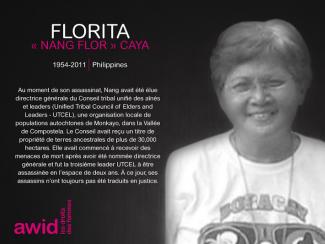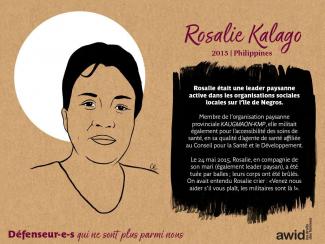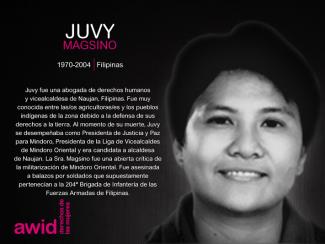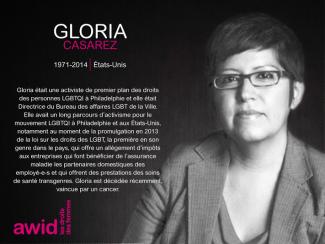
Florita Nang Flor Caya

WHRDs are self-identified women and lesbian, bisexual, transgender, queer and intersex (LBTQI) people and others who defend rights and are subject to gender-specific risks and threats due to their human rights work and/or as a direct consequence of their gender identity or sexual orientation.
WHRDs are subject to systematic violence and discrimination due to their identities and unyielding struggles for rights, equality and justice.
The WHRD Program collaborates with international and regional partners as well as the AWID membership to raise awareness about these risks and threats, advocate for feminist and holistic measures of protection and safety, and actively promote a culture of self-care and collective well being in our movements.
WHRDs are exposed to the same types of risks that all other defenders who defend human rights, communities, and the environment face. However, they are also exposed to gender-based violence and gender-specific risks because they challenge existing gender norms within their communities and societies.
We work collaboratively with international and regional networks and our membership
We aim to contribute to a safer world for WHRDs, their families and communities. We believe that action for rights and justice should not put WHRDs at risk; it should be appreciated and celebrated.
Promoting collaboration and coordination among human rights and women’s rights organizations at the international level to strengthen responses concerning safety and wellbeing of WHRDs.
Supporting regional networks of WHRDs and their organizations, such as the Mesoamerican Initiative for WHRDs and the WHRD Middle East and North Africa Coalition, in promoting and strengthening collective action for protection - emphasizing the establishment of solidarity and protection networks, the promotion of self-care, and advocacy and mobilization for the safety of WHRDs;
Increasing the visibility and recognition of WHRDs and their struggles, as well as the risks that they encounter by documenting the attacks that they face, and researching, producing, and disseminating information on their struggles, strategies, and challenges:
Mobilizing urgent responses of international solidarity for WHRDs at risk through our international and regional networks, and our active membership.

กรุณาสมัครใหม่อีกครั้ง โลกได้เปลี่ยนไปจากปี 2564 และเราขอเชิญชวนให้คุณเสนอกิจกรรมที่ถ่ายทอดความจริงและสิ่งที่คุณให้ความสำคัญในปัจจุบัน

En Europe de l’Ouest et du Sud-Est ces défenseuses des droits humains ont voué leur vie à mener des campagnes ou des recherches. Elles ont été membres de différents mouvements pour la paix ou pour les droits des femmes et ont contribué à les faire évoluer par le biais de l'action politique, de l’activisme social ou à travers la danse. Nous les remercions infiniment pour l'héritage qu'elles nous ont laissé. Nous vous invitons à vous joindre à l’AWID pour rendre hommage à ces femmes, à leur activisme et à l’héritage qu’elles nous ont laissé. Faites ces mèmes auprès de vos collègues et amis ainsi que dans vos réseaux et en twittez en utilisant les hashtags #WHRDTribute et #16Jours.
S'il vous plaît cliquez sur chaque image ci-dessous pour voir une version plus grande et pour télécharger comme un fichier





Argentina tiene una larga historia de cooperativas autogestionadas y lugares de trabajo controlados por lxs trabajadorxs.
En 2001, el país vivió una de las peores crisis económicas de su historia.
Como respuesta a la recesión y como forma de resistencia y resiliencia, lxs trabajadorxs de todo el país comenzaron a ocupar sus lugares de trabajo.
La Cooperativa Textil Nadia Echazú fue la primera cooperativa creada por y para personas trans y travesti en busca de autonomía económica y condiciones de vida dignas.
Proporciona oportunidades de trabajo, acceso a la seguridad social, ingresos sostenibles y derechos económicos para las comunidades a las que sirve.


Le cadre de référence de votre recherche vous guidera tout au long du processus de recherche. Le document de référence que vous élaborez peut aussi servir de note de synthèse destinée aux personnes qui vous conseillent et à vos partenaires, ainsi qu’à une demande de financement aux éventuels donateurs.
Dans cette section
Avant de mener toute recherche :
- Fixez les objectifs de votre recherche.
- Dressez la liste des questions principales auxquelles vous souhaitez que votre recherche réponde.
- Écrivez les types de données que vous devrez recueillir et examinez-les pour répondre à vos questions principales.
- Définissez les produits finaux que vous élaborerez à l’aide de votre recherche.
Le cadre de votre recherche pourra évoluer avec le temps, alors que vous peaufinez vos questions et recueillez de nouvelles informations. Cependant, le fait de créer un cadre de recherche dès le départ vous permettra de travailler à partir d’une base solide.
Afin que votre recherche WITM ait une base solide, il est important de définir clairement ce que vous souhaitez accomplir.
Par exemple, l’un des objectifs de la recherche mondiale WITM de l’AWID consistait à fournir des données rigoureuses afin de prouver ce que nous savions déjà par ouï-dire : que les organisations de droits des femmes sont sous-financées, et de surcroît de façon marquée. Ces données nous permettraient selon nous d’être en meilleure position pour influencer les prises de décisions des bailleurs de fonds.
Vos objectifs pourraient être les suivants :
Structurez votre processus de recherche à l’aide de questions clés auxquelles seule votre recherche puisse répondre et limitez ces questions à un laps de temps spécifique (p. ex. la dernière année, les derniers cinq ans, etc.).
Tenez compte des aspects suivants :
Le fait de choisir une période spécifique pour votre recherche peut mener à des résultats plus précis qu’ils ne le seraient si vous travailliez avec un calendrier ouvert. De plus, la décision de répéter ou non votre recherche à intervalles réguliers vous permettra de fixer des repères de collecte de données, facilitant la reproduction et la comparaison au fil du temps.
Principales questions qui ont guidé le processus de recherche WITM de l’AWID :
- Quelle est la situation actuelle quant à la durabilité financière des organisations de droits des femmes à travers le monde ?
- Quelles sont les tendances externes et internes qui influent sur les décisions de financement des donateurs à l’appui des organisations et des mouvements de femmes ?
Maintenant que vous avez défini vos questions principales, vous pouvez déterminer les types de données qui vous aideront à répondre à ces questions. Ainsi, vous serez en mesure de planifier le reste du calendrier de votre recherche WITM.
Par exemple, est-ce que vous mènerez une enquête qui couvre une vaste proportion de votre population prioritaire ? Est-ce que vous analyserez les demandes de financement que les bailleurs de fonds reçoivent dans une région particulière ? Est-ce que vous procéderez à des interviews (recommandé) ? En déterminant quelles sont les données dont vous avez besoin, vous pourrez entrer en contact avec des parties externes qui vous fourniront ces données dès le départ, et serez à même de planifier en conséquence l’ensemble de votre calendrier. Nous vous suggérons les sources de données suivantes :
La diversité des ensembles de données constitue un excellent moyen de créer une analyse robuste et riche.
Par exemple, les données de l’Enquête mondiale de l’AWID en 2011 sont les piliers de nos récentes analyses. Cependant, nous avons également recueilli des données d’interviews sur le terrain, avec des donateurs, des activistes ou des organisations de droits des femmes.
L’élaboration d’un plan initial sur les produits que vous créerez vous permettra non seulement de fixer votre calendrier, mais vous donnera également une idée des ressources dont vous aurez besoin.
Par exemple, produirez-vous uniquement un rapport de recherche ou créerez-vous également des infographies, des dépliants et des présentations ? Selon les produits que vous choisirez, vous aurez peut-être à recourir à des sociétés de conception graphique, à prévoir des manifestations, etc.
Ces produits seront également les outils que vous utiliserez pour atteindre vos objectifs. Ainsi, il est important de garder ces objectifs à l’esprit. Par exemple, votre recherche WITM a-t-elle pour unique objectif de servir d’outil de plaidoyer visant à influencer les bailleurs de fonds ? Si tel est le cas, vos produits devraient vous permettre de mobiliser les bailleurs de fonds de manière significative.
Exemples de produits :
Le fait d’établir un cadre de recherche portant sur les objectifs, les questions principales, les types de données et les produits finaux vous permettra de créer un calendrier bien planifié, de préparer vos ressources à l’avance et de fixer un budget réaliste.
Cette démarche facilitera les interactions avec les partenaires externes, tout en vous permettant de gérer plus aisément les contretemps inattendus.

• 1 mois
• 1 personne (ou plus) chargée de la recherche
• Exemple 1 : Cadre de référence d’une recherche
• Exemple 2 : Cadre de référence d’une recherche

L'espérance de vie d'une personne trans et travesti en Argentine est de 37 ans - l'âge moyen de la population générale est de 77 ans.


La recherche documentaire peut se dérouler tout au long de votre initiative. Elle peut vous aider à encadrer vos travaux, à choisir des questions de sondage et à comprendre vos résultats.
Dans cette section
- Préciser le contexte
- S’appuyer sur les connaissances existantes
- Sources éventuelles d’information pour la recherche documentaire
1. Sites Web et rapports annuels des donateurs
2. Sources d’information en ligne
La réalisation de recherches documentaires tout au long de votre initiative peut vous aider à encadrer vos travaux, à choisir les questions de sondage et à vous fournir une clarté contextuelle, tout en rehaussant votre compréhension des résultats de votre sondage. Vous pourriez notamment comparer les similarités et les différences entre les résultats de votre sondage et l’information diffusée par la société civile et les donateurs.
Il se peut que vous déceliez des tendances dans les résultats de votre sondage et que vous souhaitiez mieux les comprendre.
Par exemple, vos données de sondage pourraient révéler que les budgets des organisations diminuent, mais cela ne vous dit pas pour quelle raison cette situation se produit. L’analyse des publications vous donne un contexte et vous révèle certaines des raisons pour lesquelles ces tendances surviennent.
La recherche documentaire garantit également que vous appuyez votre recherche sur les connaissances existantes touchant à votre sujet d’intérêt, confirmant ainsi la validité et la pertinence de vos résultats.
Vos résultats pourraient être complémentaires ou contradictoires par rapport aux connaissances actuelles, mais ils doivent faire référence aux données existantes sur le sujet.
Pour que votre recherche soit complète et englobe tout le panorama du financement qui entoure votre sujet, examinez une gamme de secteurs de financement.
Vous pouvez notamment considérer :
- Les fonds pour les femmes
- Les fondations privées et publiques
- Les organisations non gouvernementales internationales (ONGI)
- Les agences bilatérales et multilatérales
- Les acteurs et actrices du secteur privé
- Les philanthropes
- Les groupes de financement participatif
Inclure tout secteur pertinent dans le cadre de référence de votre recherche.
Par exemple, vous pourriez décider qu’il est important d’effectuer des recherches sur les organisations non gouvernementales (ONG) locales.
Voici des sources directes d’information sur les actions des bailleurs de fonds qui contiennent habituellement des renseignements sur les politiques et les budgets. Si vous réalisez vos recherches avant d’interviewer les donateurs, vos questions seront mieux ciblées et vos interviews plus solides.

• 1-2 mois
• 1 personne (ou plus) chargée de la recherche
7. Synthétisez les résultats de votre recherche

THE EXCLUSION, STIGMA AND INSTITUTIONAL ABUSE
that trans and travesti people continue to face on a daily basis

Día 2